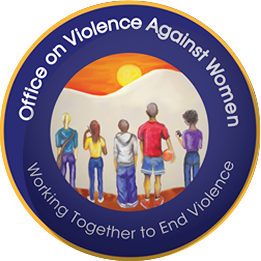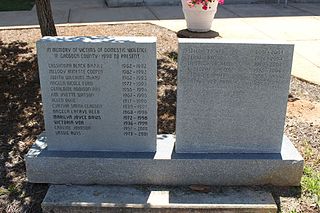Related Research Articles

Sex trafficking is human trafficking for the purpose of sexual exploitation. It has been called a form of modern slavery because of the way victims are forced into sexual acts non-consensually, in a form of sexual slavery. Perpetrators of the crime are called sex traffickers or pimps—people who manipulate victims to engage in various forms of commercial sex with paying customers. Sex traffickers use force, fraud, and coercion as they recruit, transport, and provide their victims as prostitutes. Sometimes victims are brought into a situation of dependency on their trafficker(s), financially or emotionally. Every aspect of sex trafficking is considered a crime, from acquisition to transportation and exploitation of victims. This includes any sexual exploitation of adults or minors, including child sex tourism (CST) and domestic minor sex trafficking (DMST).

The Violence Against Women Act of 1994 (VAWA) is a United States federal law signed by President Bill Clinton on September 13, 1994. The Act provided $1.6 billion toward investigation and the prosecution of violent crimes against women, imposed automatic and mandatory restitution on those convicted, and allowed civil redress when prosecutors chose to not prosecute cases. The Act also established the Office on Violence Against Women within the U.S. Department of Justice.

A women's shelter, also known as a women's refuge and battered women's shelter, is a place of temporary protection and support for women escaping domestic violence and intimate partner violence of all forms. The term is also frequently used to describe a location for the same purpose that is open to people of all genders at risk.

The United States Office on Violence Against Women (OVW) was created following the Violence Against Women Act (VAWA) of 1994. The Act was renewed in 2005, 2013 and again in 2022. The Violence Against Women Act legislation requires the Office on Violence Against Women to work to respond to and reduce violence against women in many different areas, including on college campuses and in people's homes. VAWA requires Office on Violence Against Women to administer justice and strengthen services for victims of domestic violence, dating violence, sexual assault, and stalking.

Violence against women (VAW), also known as gender-based violence and sexual and gender-based violence (SGBV), is violent acts primarily or exclusively committed by men or boys against women or girls. Such violence is often considered a form of hate crime, committed against women or girls specifically because they are female, and can take many forms.

The Tahirih Justice Center, or Tahirih, is a national charitable non-governmental organization headquartered in Falls Church, Virginia, United States, that aims to protect immigrant women and girls fleeing gender-based violence and persecution. Tahirih's holistic model combines free legal services and social services case management with public policy advocacy, training and education.

The National Network to End Domestic Violence(NNEDV) is a 501(c)(3) not-for-profit organization founded in 1990, based in the District of Columbia. It is a network of state and territorial domestic violence coalitions, representing over 2,000 member organizations nationwide. The National Network to End Domestic Violence works to address the many aspects of domestic violence.

Domestic violence is violence or other abuse that occurs in a domestic setting, such as in a marriage or cohabitation. Domestic violence is often used as a synonym for intimate partner violence, which is committed by one of the people in an intimate relationship against the other person, and can take place in relationships or between former spouses or partners. In its broadest sense, domestic violence also involves violence against children, parents, or the elderly. It can assume multiple forms, including physical, verbal, emotional, economic, religious, reproductive, financial abuse, or sexual abuse, or combinations of these. It can range from subtle, coercive forms to marital rape and other violent physical abuse, such as choking, beating, female genital mutilation, and acid throwing that may result in disfigurement or death, and includes the use of technology to harass, control, monitor, stalk or hack. Domestic murder includes stoning, bride burning, honor killing, and dowry death, which sometimes involves non-cohabitating family members. In 2015, the United Kingdom's Home Office widened the definition of domestic violence to include coercive control.

National Coalition Against Domestic Violence (NCADV) is a 501(c)(3) nonprofit organization with the mission of being the voice of victims and survivors of domestic violence. Based in Denver, Colorado. National Coalition Against Domestic Violence's objective is to create a society that holds domestic abusers responsible for their activity.
Specialized domestic violence courts are designed to improve victim safety and enhance defendant accountability. There is no one set definition of a specialized violence court, although these types of courts can be either civil or criminal and typically hear the majority of an area's domestic violence cases on a separate calendar. Additionally, these courts are typically led by specially assigned judges who can make more informed and consistent decisions based on their expertise and experience with the unique legal and personal issues in domestic violence cases.
Legal Momentum, founded in 1970, is a 501(c)(3) nonprofit and the nation's first and longest-serving legal advocacy group for women in the United States. Betty Friedan and Muriel Fox were its co-founders and Muriel Fox is an ongoing leader of the organization. Carol Baldwin Moody became President and CEO in April 2018. The organization, founded as the NOW Legal Defense and Education Fund, became Legal Momentum in 2004. Legal Momentum is a multi-issue organization dedicated to advancing women’s rights and gender equality, particularly in the areas of equal education opportunities; fairness in the courts; ending all forms of gender-based violence; workplace equality and economic empowerment. The organization employs three main strategies: impact litigation, policy advocacy, and educational initiatives. It is headquartered in New York City.
The anti-rape movement is a sociopolitical movement which is part of the movement seeking to combat violence against and the abuse of women.
The White House Council on Women and Girls was an advisory council within the Office of Intergovernmental Affairs of the Executive Office of the President of the United States. It was established by Executive Order 13506 on March 11, 2009, with a broad mandate to advise the president on issues relating to the welfare of women and girls in order to ensure gender equality. It also ensured that other White House agencies acted in a manner to allow all things to be possible for all people. The Council was chaired by Valerie Jarrett and included the heads of every federal agency and major White House office.

The National Sexual Violence Resource Center (NSVRC) is an American nonprofit organization that addresses the causes and impact of sexual violence through collaboration, prevention, and resources. Working in collaboration with state and territory sexual assault coalitions, representatives from underserved populations, the Centers for Disease Control and Prevention, the U.S. Department of Justice's Office on Violence Against Women, and a host of community-based and national allied projects, NSVRC provides national leadership to address and prevent sexual violence.
Domestic violence in Iran is a form of violence expressed by one partner or partners against another partner or partners in the content of an intimate relationship in Iran.

Domestic violence is a form of violence that occurs within a domestic relationship. Although domestic violence often occurs between partners in the context of an intimate relationship, it may also describe other household violence, such as violence against a child, by a child against a parent or violence between siblings in the same household. In the United States, it is recognized as an important social problem by governmental and non-governmental agencies, and various Violence Against Women Acts have been passed by the US Congress in an attempt to stem this tide.

The Family Violence Prevention and Services Act (FVPSA) is a United States law, first authorized as part of the Child Abuse Amendments of 1984, that provides federal funding to help victims of domestic violence and their dependent children by providing shelter and related help, offering violence prevention programs, and improving how service agencies work together in communities.

The management of domestic violence deals with the treatment of victims of domestic violence and preventing repetitions of such violence. The response to domestic violence in Western countries is typically a combined effort between law enforcement, social services, and health care. The role of each has evolved as domestic violence has been brought more into public view.
Violence against women in New Zealand is described as the kinds of violence disproportionately affecting women compared to men, due to factors of ongoing gender inequality in society. The New Zealand government and justice system view efforts to prevent and deal with violence against women as a priority of New Zealand legislation and the criminal justice system.
The National Indigenous Women's Resource Center (NIWRC) is a nonprofit organization that provides health resources to Native American women and also advocates for women's health, housing, and domestic violence support. The organization was founded and is led by Native American women.
References
- ↑ United States Department of Health and Community Services Fact Sheet Archived April 16, 2008, at the Wayback Machine
- ↑ Toolkit To End Violence Against Women Archived December 24, 2007, at the Wayback Machine